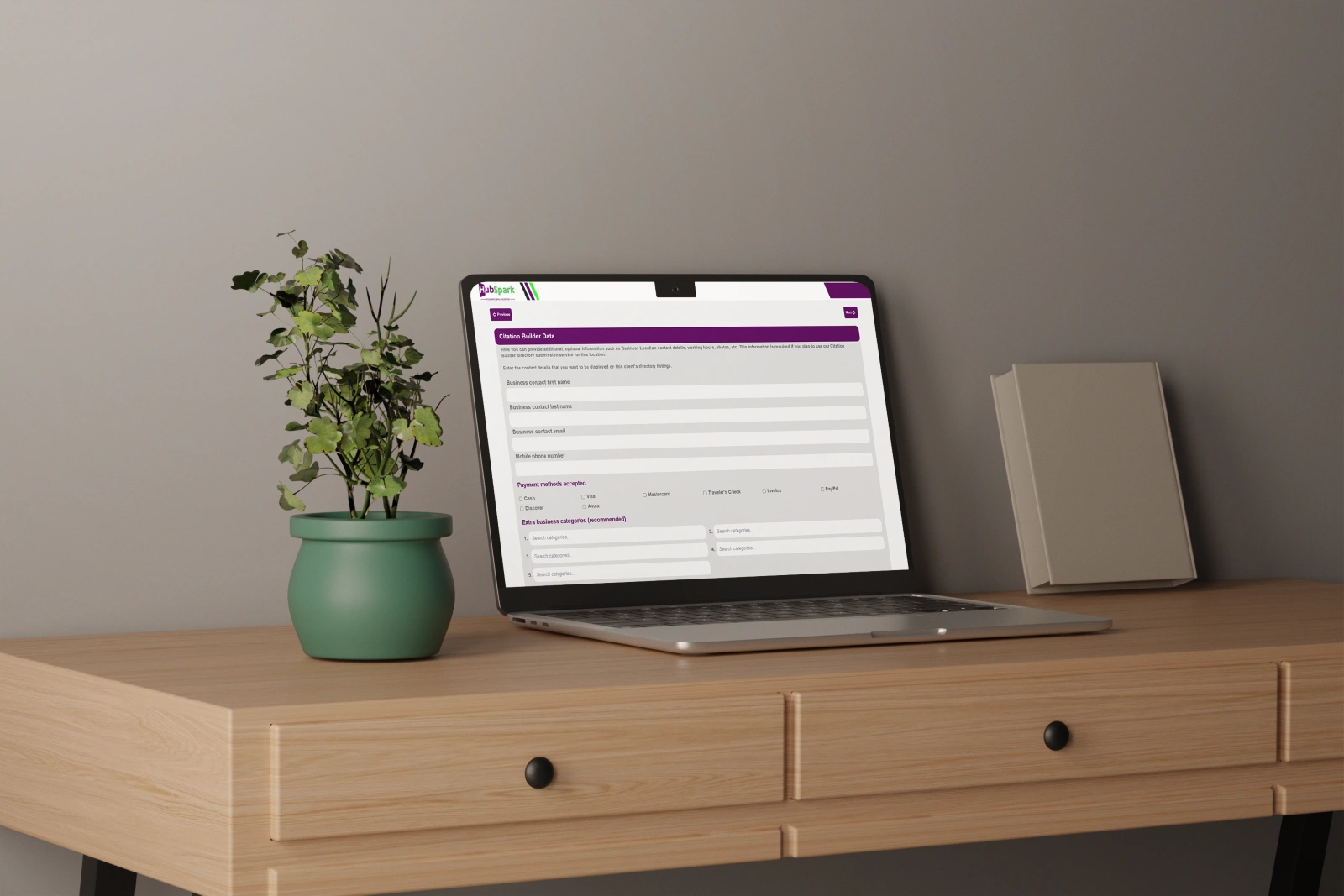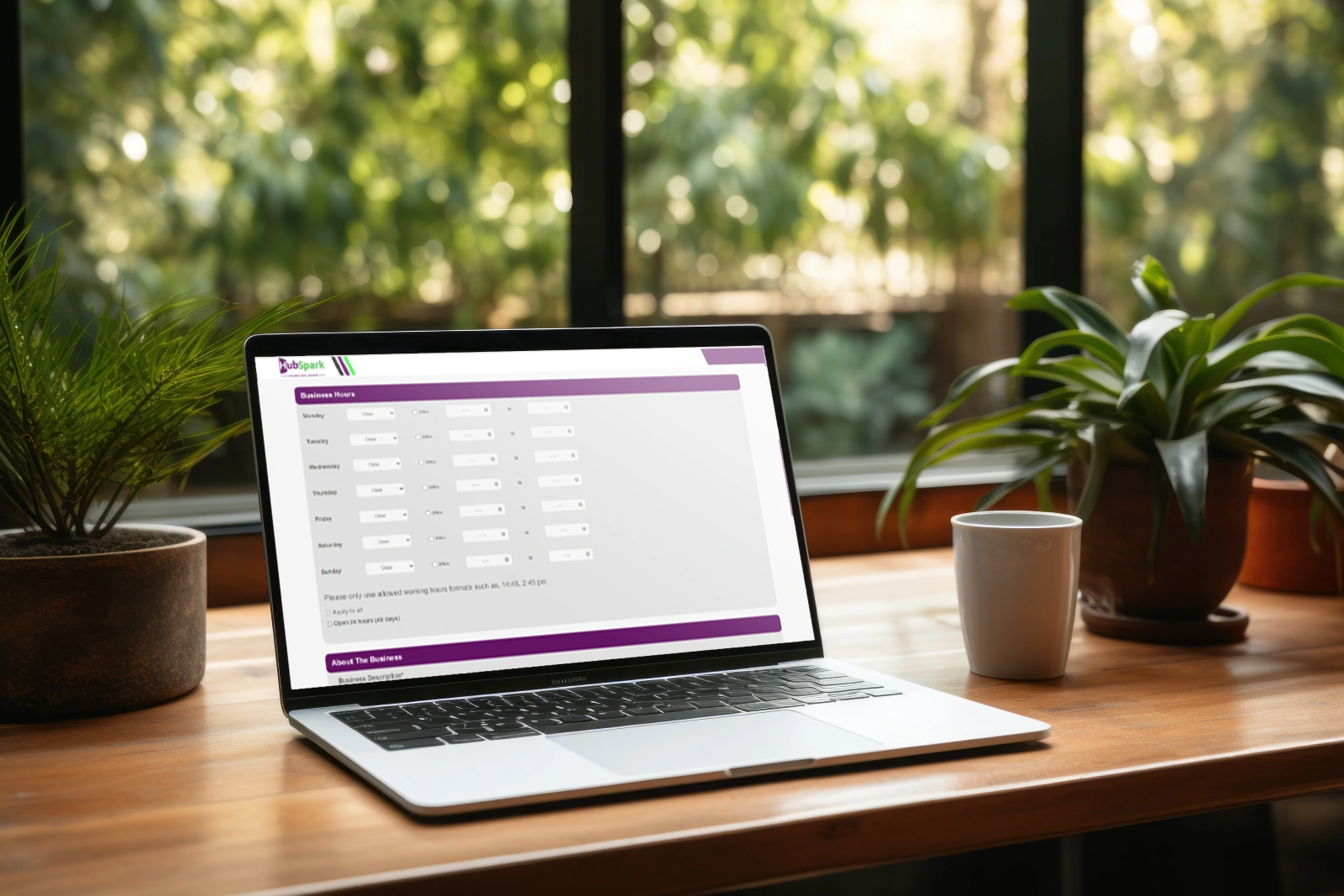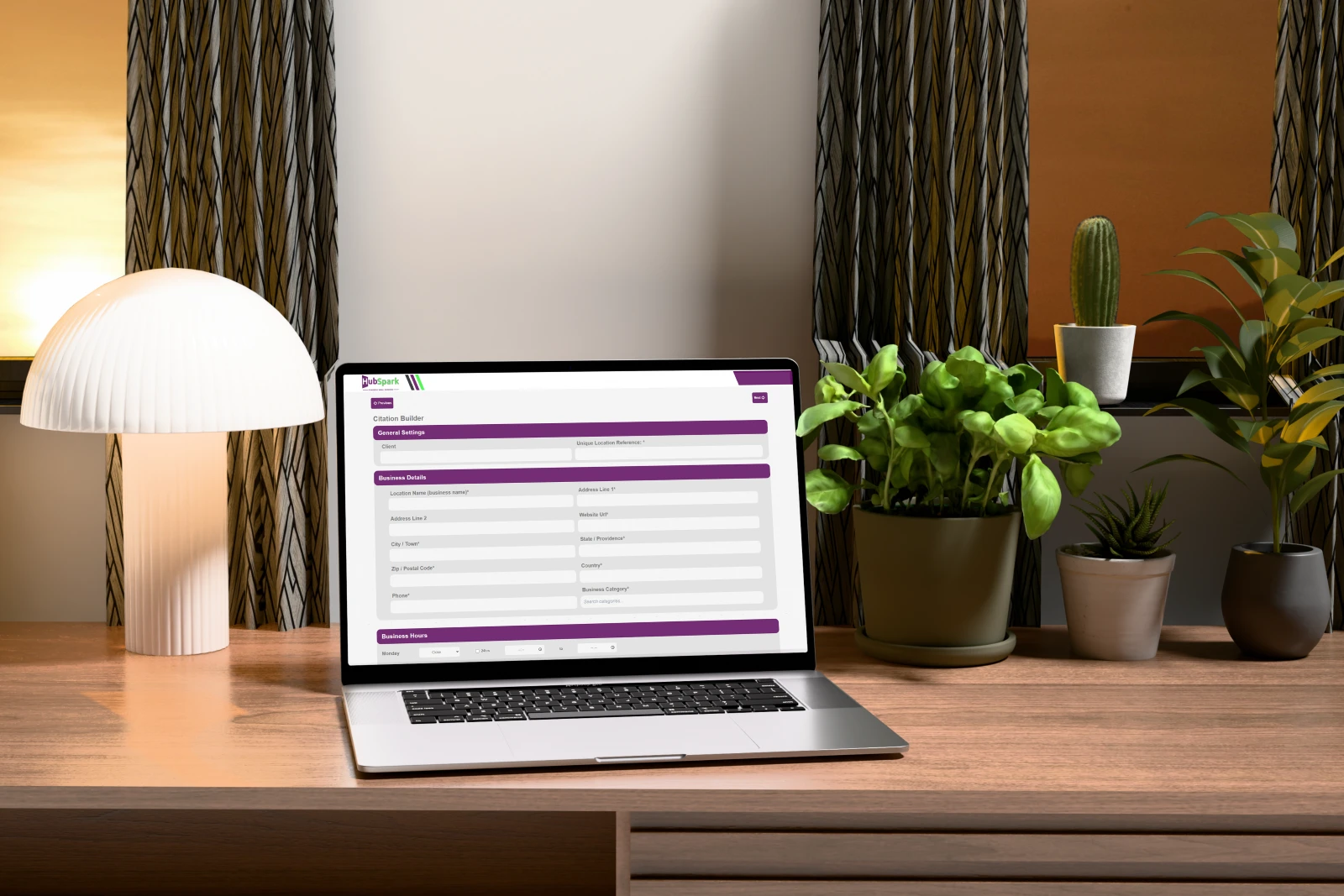Improving Your Search Ranking with Local Listings
Key Takeaways
Local listings are increasingly vital for businesses hoping to attract customers from their immediate communities. As more people use search engines to find products and services near them, having an optimized local listing can significantly improve your visibility and help you stand out from competitors. HubSpark has a citations builder that can submit local listings to 70 of the most important online directories helping both your online visibility and your local search ranking.


Understanding Local Search Ranking
Local search ranking refers to how prominently your business appears when users search online for products or services in your geographic area. Search engines like Google use a variety of factors to determine which local businesses to surface to potential customers. Local listings—digital profiles of your business on platforms such as Google Business Profile, Yelp, or Bing Places—are the foundational building blocks of this visibility.
A business with optimized and consistent local listings is more likely to be shown in the coveted “local pack” or map results, which usually appear above the standard organic listings. These listings make it easier for local customers to discover, contact, and ultimately do business with you.
To optimize your local listings effectively, ensure that all your information—such as your business name, address, phone number, and hours of operation—is accurate and consistent across all platforms. This consistency helps search engines verify that your business is legitimate and enhances your credibility. Additionally, incorporating relevant keywords in your business descriptions can further improve your chances of ranking higher in local searches.
Beyond just listing your business details, encourage satisfied customers to leave positive reviews on these platforms. Reviews not only improve your ranking but also build trust with potential customers.
Furthermore, regularly updating your listings with new photos, promotions, or events can keep your profile fresh and engaging, making it more appealing to those searching for local options. By leveraging local listings effectively, you can significantly boost your presence in local search results and connect with more customers in your area.
Why Local Listings Matter
A local listing is a structured business profile on platforms commonly used for search and directories. These listings hold key information that helps search engines trust, categorize, and recommend your business.
Local listings are not just about being found online; they also convey trust signals. Accurate listings instill confidence in customers while also increasing the likelihood of positive reviews and user engagement. Additionally, local listing signals account for a substantial proportion of local SEO ranking factors according to industry studies.


Key Elements of Effective Local Listings
An effective local listing provides clear, accurate, and comprehensive information, fostering both customer trust and search engine confidence. At a minimum, your local listing should include your business name, address, and phone number (often referred to as NAP), business hours, and website. Ensuring that all details are accurate and consistent across different listings is critical.
High-quality listings also include additional information such as categories, descriptions, photos, services, payment methods accepted, and service area—providing potential customers and search engines with a more complete understanding of your offerings.

Factors That Affect Local Search Rankings
Several important factors can influence how your local listing performs in search rankings. Each plays a distinct role in how search engines evaluate your business’s relevance and prominence for local queries.
Here are the major factors that affect your local search visibility:
- NAP Consistency: Search engines favor listings where your business name, address, and phone number are identical across all platforms. Even small inconsistencies or errors can confuse search engine algorithms and potential customers, reducing your ranking.
- Business Category Accuracy: Choosing the most relevant primary and secondary categories for your listing helps search engines map your expertise and offerings to user intent, ensuring that the right searches surface your business.
- Completeness of Profile: Businesses with fully completed profiles are given priority, as complete listings resolve more user queries and signal higher reliability.
- Location Proximity: The physical distance between the searcher and your business is a fundamental factor, but you can’t influence proximity; however, maximizing other aspects improves your chance of ranking for people further away.
- Number and Quality of Listings: Consistent appearances in reputable directories strengthen your authority and make it easier for search engines to trust your business.
- Online Reviews and Ratings: Higher ratings, positive feedback, and the steady accumulation of new reviews signal high-quality service and boost both search ranking and customer trust.
- Engagement and Activity: Google and other search engines reward listings that are updated frequently, respond to reviews, and publish new posts or photos.
Building and Optimizing Local Listings
Developing and enhancing your local business listing is an active, ongoing process. Optimizing these listings takes deliberate attention and regular maintenance.
Claim your business on the most important platforms, especially Google Business Profile, as it has the biggest impact on search visibility and user trust. After verifying ownership, thoroughly fill out every available field with genuine, up-to-date business information. Upload high-resolution images that showcase your storefront, logo, products, or team, helping customers visualize your business.
For service-area businesses, such as plumbers or caterers, specify the areas you serve. Explicitly listing neighborhoods, cities, or zip codes improves relevance for nearby searches. Maintaining accuracy when making updates—such as new phone numbers or hours—is essential, as inconsistency can harm ranking and user experience.


Ensuring Consistency Across All Listings
Consistency is a core local SEO principle. Differences in how your business is listed (for example, “Ave.” vs. “Avenue” or using a suite number inconsistently) can signal unreliability and confuse search engines.
Ensure your NAP details are exactly the same across all directory listings, citations, and your website. If you rebrand, move, or update information, make those changes everywhere. Use citation management tools if you’re listed in many directories, as these streamline the process and minimize discrepancies.
Acquiring and Managing Reviews
Reviews are a significant ranking factor for local SEO and also play a huge role in converting searchers into customers. The quantity, quality, and frequency of reviews all send trust signals to search engines.
Proactively ask satisfied customers to leave reviews, especially on major platforms like Google, Facebook, and Yelp. Respond thoughtfully to both positive and negative feedback, as engagement shows attentiveness to customer experience. Avoid incentivizing reviews or creating fake feedback, as this can damage your reputation and even result in penalties from search platforms.


Leveraging Local Listing Enhancements
Many local listing platforms offer features that extend beyond basic information. Utilizing these can further improve your rankings and visibility.
Optimize your profile with attributes such as “Black-owned,” “LGBTQ+ friendly,” or “pet friendly” if they apply, as these can influence both search ranking and customer decision-making. Use posts to share updates, promotions, or events—activity signals keep your profile fresh and relevant.
Some platforms allow integrations with booking tools or messaging features. The HubSpark Calendar allows for integrating with Google calendar to book appointments. The HubSpark Inbox provides a unified inbox for receiving all online messages.
Enabling HubSpark not only makes it easier for customers to contact you, but also sends positive engagement signals to search algorithms.
Monitoring and Measuring Results
Local search optimization does not stop after your listings are completed. Track your progress and analyze performance metrics to see where further improvements can be made.
Google Business Profile, for example, offers insights showing how often your listing appears in search, what actions users take, and popular times for calls or visits. Combine these analytics with third-party SEO tools for a fuller picture of visibility, click-through rates, and review activity. Make ongoing adjustments to improve both search rankings and customer satisfaction.

Increase Your Local SEO with HubSpark’s Citation Builder
Improving your local search ranking with robust local listings requires careful attention to detail, consistency across platforms, and active management of your online reputation. By maintaining accurate, comprehensive listings, encouraging and responding to reviews, and continually optimizing your profiles, you can dramatically increase your business’s visibility and appeal to local customers. Effective local listing management turns online searches into real-world revenue opportunities, setting you above your competition in the community.
HubSpark’s citations builder is a powerful tool designed to enhance your online visibility and local search ranking. By submitting local listings to 70 major online directories, HubSpark ensures that your business information is accurately and consistently displayed across the web. This not only boosts your visibility to potential customers but also strengthens your credibility with search engines, potentially leading to higher rankings in local search results.
With HubSpark’s citations builder, you can streamline the process of managing your online presence and stay ahead of the competition in the digital landscape. Having consistent local listings helps businesses with their local SEO efforts, ultimately driving more traffic and generating new leads.
Frequently Asked Questions
A local business listing serves as an essential online profile that includes your business details—such as name, address, phone number, hours, and services—on platforms like Google, Yelp, or Bing. These listings enhance local SEO visibility, making it easier for search engines and local audiences to find and contact your business within your geographic area.
You should update your local business listings whenever your information changes, such as a new address, phone number, or business hours. Implementing local SEO strategies by regularly reviewing listings at least once every quarter is also recommended to catch and correct any discrepancies or outdated information.
Yes, service-area businesses without a physical storefront can still achieve high local rankings in search results by clearly defining their service areas in local directories and maintaining accurate, consistent information across all profiles. Emphasizing positive reviews and optimizing local landing pages can also enhance your local SEO visibility.

Request a Free Demo
(no credit card required)

Local listings are increasingly vital for businesses hoping to attract customers from their immediate communities. As more people use search engines to find products and services near them, having an optimized local listing can significantly improve your visibility and help you stand out from competitors. HubSpark has a citations builder that can submit local listings to 70 of the most important online directories helping both your online visibility and your local search ranking.
Understanding Local Search Ranking

Local search ranking refers to how prominently your business appears when users search online for products or services in your geographic area. Search engines like Google use a variety of factors to determine which local businesses to surface to potential customers. Local listings—digital profiles of your business on platforms such as Google Business Profile, Yelp, or Bing Places—are the foundational building blocks of this visibility.
A business with optimized and consistent local listings is more likely to be shown in the coveted “local pack” or map results, which usually appear above the standard organic listings. These listings make it easier for local customers to discover, contact, and ultimately do business with you.
To optimize your local listings effectively, ensure that all your information—such as your business name, address, phone number, and hours of operation—is accurate and consistent across all platforms. This consistency helps search engines verify that your business is legitimate and enhances your credibility. Additionally, incorporating relevant keywords in your business descriptions can further improve your chances of ranking higher in local searches.
Beyond just listing your business details, encourage satisfied customers to leave positive reviews on these platforms. Reviews not only improve your ranking but also build trust with potential customers.
Furthermore, regularly updating your listings with new photos, promotions, or events can keep your profile fresh and engaging, making it more appealing to those searching for local options. By leveraging local listings effectively, you can significantly boost your presence in local search results and connect with more customers in your area.
Why Local Listings Matter

A local listing is a structured business profile on platforms commonly used for search and directories. These listings hold key information that helps search engines trust, categorize, and recommend your business.
Local listings are not just about being found online; they also convey trust signals. Accurate listings instill confidence in customers while also increasing the likelihood of positive reviews and user engagement. Additionally, local listing signals account for a substantial proportion of local SEO ranking factors according to industry studies.
Key Elements of Effective Local Listings

An effective local listing provides clear, accurate, and comprehensive information, fostering both customer trust and search engine confidence. At a minimum, your local listing should include your business name, address, and phone number (often referred to as NAP), business hours, and website. Ensuring that all details are accurate and consistent across different listings is critical.
High-quality listings also include additional information such as categories, descriptions, photos, services, payment methods accepted, and service area—providing potential customers and search engines with a more complete understanding of your offerings.
Factors That Affect Local Search Rankings

Several important factors can influence how your local listing performs in search rankings. Each plays a distinct role in how search engines evaluate your business’s relevance and prominence for local queries.
Here are the major factors that affect your local search visibility:
- NAP Consistency: Search engines favor listings where your business name, address, and phone number are identical across all platforms. Even small inconsistencies or errors can confuse search engine algorithms and potential customers, reducing your ranking.
- Business Category Accuracy: Choosing the most relevant primary and secondary categories for your listing helps search engines map your expertise and offerings to user intent, ensuring that the right searches surface your business.
- Completeness of Profile: Businesses with fully completed profiles are given priority, as complete listings resolve more user queries and signal higher reliability.
- Location Proximity: The physical distance between the searcher and your business is a fundamental factor, but you can’t influence proximity; however, maximizing other aspects improves your chance of ranking for people further away.
- Number and Quality of Listings: Consistent appearances in reputable directories strengthen your authority and make it easier for search engines to trust your business.
- Online Reviews and Ratings: Higher ratings, positive feedback, and the steady accumulation of new reviews signal high-quality service and boost both search ranking and customer trust.
- Engagement and Activity: Google and other search engines reward listings that are updated frequently, respond to reviews, and publish new posts or photos.
Building and Optimizing Local Listings

Developing and enhancing your local business listing is an active, ongoing process. Optimizing these listings takes deliberate attention and regular maintenance.
Claim your business on the most important platforms, especially Google Business Profile, as it has the biggest impact on search visibility and user trust. After verifying ownership, thoroughly fill out every available field with genuine, up-to-date business information. Upload high-resolution images that showcase your storefront, logo, products, or team, helping customers visualize your business.
For service-area businesses, such as plumbers or caterers, specify the areas you serve. Explicitly listing neighborhoods, cities, or zip codes improves relevance for nearby searches. Maintaining accuracy when making updates—such as new phone numbers or hours—is essential, as inconsistency can harm ranking and user experience.
Ensuring Consistency Across All Listings

Consistency is a core local SEO principle. Differences in how your business is listed (for example, “Ave.” vs. “Avenue” or using a suite number inconsistently) can signal unreliability and confuse search engines.
Ensure your NAP details are exactly the same across all directory listings, citations, and your website. If you rebrand, move, or update information, make those changes everywhere. Use citation management tools if you’re listed in many directories, as these streamline the process and minimize discrepancies.
Acquiring and Managing Reviews

Reviews are a significant ranking factor for local SEO and also play a huge role in converting searchers into customers. The quantity, quality, and frequency of reviews all send trust signals to search engines.
Proactively ask satisfied customers to leave reviews, especially on major platforms like Google, Facebook, and Yelp. Respond thoughtfully to both positive and negative feedback, as engagement shows attentiveness to customer experience. Avoid incentivizing reviews or creating fake feedback, as this can damage your reputation and even result in penalties from search platforms.
Leveraging Local Listing Enhancements

Many local listing platforms offer features that extend beyond basic information. Utilizing these can further improve your rankings and visibility.
Optimize your profile with attributes such as “Black-owned,” “LGBTQ+ friendly,” or “pet friendly” if they apply, as these can influence both search ranking and customer decision-making. Use posts to share updates, promotions, or events—activity signals keep your profile fresh and relevant.
Some platforms allow integrations with booking tools or messaging features. The HubSpark Calendar allows for integrating with Google calendar to book appointments. The HubSpark Inbox provides a unified inbox for receiving all online messages.
Enabling HubSpark not only makes it easier for customers to contact you, but also sends positive engagement signals to search algorithms.
Monitoring and Measuring Results

Local search optimization does not stop after your listings are completed. Track your progress and analyze performance metrics to see where further improvements can be made.
Google Business Profile, for example, offers insights showing how often your listing appears in search, what actions users take, and popular times for calls or visits. Combine these analytics with third-party SEO tools for a fuller picture of visibility, click-through rates, and review activity. Make ongoing adjustments to improve both search rankings and customer satisfaction.
Increase Your Local SEO with HubSpark’s Citation Builder
Improving your local search ranking with robust local listings requires careful attention to detail, consistency across platforms, and active management of your online reputation. By maintaining accurate, comprehensive listings, encouraging and responding to reviews, and continually optimizing your profiles, you can dramatically increase your business’s visibility and appeal to local customers. Effective local listing management turns online searches into real-world revenue opportunities, setting you above your competition in the community.
HubSpark’s citations builder is a powerful tool designed to enhance your online visibility and local search ranking. By submitting local listings to 70 major online directories, HubSpark ensures that your business information is accurately and consistently displayed across the web. This not only boosts your visibility to potential customers but also strengthens your credibility with search engines, potentially leading to higher rankings in local search results.
With HubSpark’s citations builder, you can streamline the process of managing your online presence and stay ahead of the competition in the digital landscape. Having consistent local listings helps businesses with their local SEO efforts, ultimately driving more traffic and generating new leads.
FAQ
1. What is a local business listing?
A local business listing serves as an essential online profile that includes your business details—such as name, address, phone number, hours, and services—on platforms like Google, Yelp, or Bing. These listings enhance local SEO visibility, making it easier for search engines and local audiences to find and contact your business within your geographic area.
2. How often should I update my local listings?
You should update your local business listings whenever your information changes, such as a new address, phone number, or business hours. Implementing local SEO strategies by regularly reviewing listings at least once every quarter is also recommended to catch and correct any discrepancies or outdated information.
3. Can I improve my ranking without a physical storefront?
Yes, service-area businesses without a physical storefront can still achieve high local rankings in search results by clearly defining their service areas in local directories and maintaining accurate, consistent information across all profiles. Emphasizing positive reviews and optimizing local landing pages can also enhance your local SEO visibility.

 Demo
Demo